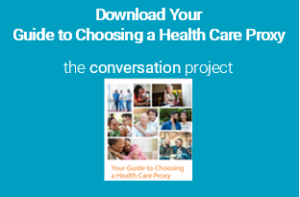“Who do you want to be your health care proxy, me or Mom?”
My dad asked me this shortly before I went to college in 2015, and I had no idea what a health care proxy was. He explained that it’s a designated person who you trust to speak with medical professionals on your behalf if you are not able to yourself.
This was daunting for me to consider. I was lucky enough to not have experienced any medical issues beyond typical bouts of strep throat, ear infections, and a routine tonsillectomy until that point. But after a brief conversation with my dad (who I chose as my proxy), I did feel a sense of security knowing that if something were to happen to me at school, my health care wishes would be respected.
Since I was close with both of my parents, it made sense to designate one of them as my health care proxy — I knew they would both do their best to make sure I was taken care of the way I wanted, and that both of them would be present if I did experience a medical emergency. However, I decided on my dad specifically because he is typically the calmer one in tough situations, specifically medical ones. I remembered my dad taking my siblings and I to our pediatrician’s office for every vaccine, because my mom was not only squeamish around needles but said it was extremely difficult for her to see us in any kind of pain. I explained this to my mom and also made it clear that I did not want to exclude her; I felt it was in her best interest to leave the actual decision-making up to my dad, but of course I trusted her to take care of me and I would want her with me if, say, I was hospitalized.
Because of my dad bringing it up before I headed to college, I was not totally surprised when my boyfriend of nearly two years — let’s call him Max for privacy’s sake — asked if I would be his health care proxy in 2022. He had just graduated medical school, and was set to start his residency soon in New York City, where we’d be moving in together.
Almost all of our conversations then revolved around the future — from which apartment we could see ourselves living in (and afford) to whether we would be able to adopt a dog (and which breed). So it made sense to have the health care proxy conversation. I will acknowledge that my discussion with Max was different from most people’s, since he was entering residency and had already seen firsthand the consequences of people not designating a health care proxy in advance. He had expressed to me before how difficult it was for him and other hospital staff members to witness family members arguing over how to take care of a loved one — such as whether to intubate them or not — and how it took time away from caring for the patient. He explained that when a patient already had a health care proxy designated before going into the hospital, and had made their wishes clear to them, it was much easier for doctors and nurses to treat them and took part of the stress off of the patient’s family as well.
Max also asked me specific questions that my dad had not years ago. We got more into the weeds on some medical scenarios – but still tried to focus more on what mattered to us and not just medical hypotheticals. But, just as I had after talking to my dad about it, I felt relieved after Max and I both discussed what we would want for ourselves in case of a health care emergency. For example, both of us would not want any treatment that would become permanent once we recovered, unless absolutely necessary, and we both agreed that we would want CPR performed on us if needed.
The primary reason I wanted Max to be my health care proxy once we moved was that my parents live in Cleveland. Of course, they’re only an hour away by plane and still in the same time zone, but Max could still be reached faster. He also had no qualms about discussing being each other’s health care proxies, while I knew it was stressful for my parents to consider, and I wanted to be able to speak openly about the topic in the future if, say, my feelings had changed about my medical wishes. This was also an important step for Max and me in building a future together, along with moving into an apartment, adopting a dog, etc.
And, while Max’s family was closer to him (in the New York suburbs), he still felt it was more appropriate to designate me as his health care proxy, as we were going to live together and he could communicate his wishes to me at any time. We had a second conversation about this months after we’d moved in; he’d settled into his job, I’d started working as a substitute teacher, and we’d adopted a dog. We realized that nothing had changed about any of our wishes, but after all these changes we felt it was worth discussing again. I’m sure that we will continue to have these conversations in the future, as we undergo more life changes and build on our relationship — for example, if we do end up getting married, or having children, of course we might want to reevaluate our medical wishes. Plus, after our first discussion, it was a lot less intimidating, and I anticipate that in the future, it will be even easier.
Some tips for having conversations:
- Establish a set time with your partner to discuss being each other’s health care proxies, rather than bringing it up randomly. This will give you both time to think about what you really want and to do research if you’d like.
- Having the conversation about what you and your partner want, medically speaking, can be daunting, so make sure you have it somewhere you feel comfortable. You might want to discuss it at home, on the couch or over dinner, or maybe you’d feel better if there were other things going on around you. You could always sit down for coffee and discuss it, or go for a walk.
- Talk to your health care provider if you have any questions or concerns. I do not recommend Googling questions you have, as this can turn up an overwhelming amount of results — many of which are inaccurate or unhelpful.
- Check out resources online! IHI’s Conversation Project offers multiple free guides on how to navigate this process and other health care concerns. Reading their blog posts or social media posts (Instagram, Facebook, or Twitter) is much more helpful than combing the whole internet for health care advice.
- Know that your wishes might change, and that’s okay. You can always talk about this with your health care proxy.


